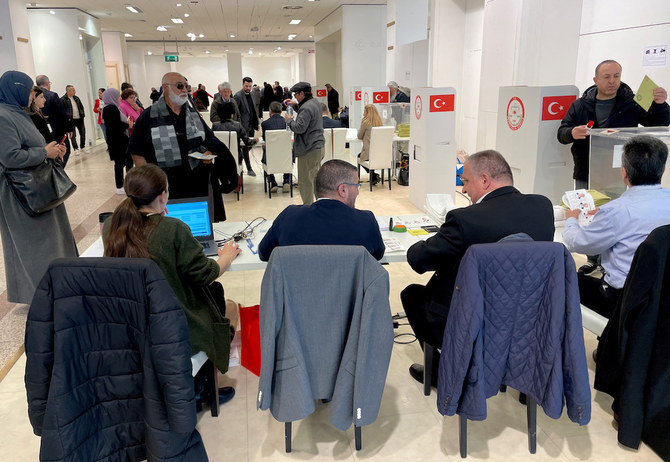
With just over a week until Turks vote in the most critical elections their country’s history, all eyes are fixed on what the outcome will mean for both Turkiye and the wider region.
As regional developments have dramatically affected the course of Turkish foreign policy, the parliamentary and presidential elections are significant for countries that either enjoy close ties or have recently mended ties with Ankara.
Coinciding with the republic’s centenary, about 60 million voters will decide whether to continue with the ruling AKP, which has been in power for more than two decades, or bring the six-party opposition alliance to power. The elections take place at the start of a new era of normalization in the region. Within this context, the result of the vote is particularly important for the regional countries that hope for predictable Turkish foreign policy, whoever wins.
Since the AKP came to power in November 2002, Turkiye has been playing a more active role in the Middle East, engaging in both cooperation and competition with other states. While Ankara’s involvement in regional issues opened doors for growing Turkish influence in the region, it also caused tensions. Turkiye’s regional policies have also led to criticism by the opposition, which in the past few years has rolled up its sleeves to prioritize foreign policy. While the government engaged in efforts to reconcile its relations with regional countries, the main opposition CHP also tried to create a new vision in its foreign policy to increase its number of friends abroad. So foreign policy has been important for both government and opposition.
Although the opposition’s priority if it wins will be domestic matters, it has vowed to reexamine Turkiye’s relationship with regional and international players; the CHP leadership has even changed the internal dynamics in the party to create new nominees for foreign policy.
The result of the vote is particularly important for the regional countries that hope for predictable Turkish foreign policy, whoever wins.
Sinem Cengiz
There are three main regional policy areas in which the opposition aims to reverse many of the government’s signature policies. First, in the past decade Ankara has adopted a militarized foreign policy in the Middle East, launching four military operations to Syria, conducting counter-terrorism operations in Iraq, and sending military support to Libya. The opposition wants to end Turkiye’s cross-border operations and its military presence abroad. Libya is one of the areas where Turkiye’s policies will be reconsidered if the ruling party is unseated.
Second, as the Syrian conflict has had a major impact on Turkiye’s domestic and foreign policies, the elections are also vital for Syrian refugees in Turkiye. The estimated 3.6 million Syrian refugees in Turkiye have become a part of the election debate, as opposition parties are campaigning to send them home. If the opposition comes out victorious, they plan to withdraw from northern Syria and engage in dialogue with the Assad regime for the peaceful repatriation of refugees and reconstruction of the country. The Turkish government has also been seeking a rapprochement with the Syrian regime. Four days before the elections, the Turkish foreign minister is due to meet his Syrian and Russian counterparts in Moscow for talks. Thus, in either scenario, whether change or continuity in the Turkish government, a reconciliation with Syria is on the horizon. However, the tricky part would be the withdrawal of the Turkish military from northern Syria and repatriation of refugees. Although the opposition has echoed the government’s plans to return some refugees to Syria, it has yet not set out how that could safely be accomplished.
Third, although the opposition considered Turkiye’s rapprochement with Saudi Arabia and the UAE to be a positive development in decreasing tensions in the region, it has been skeptical of the intentions behind the government’s attempt at resetting ties. In this regard, Turkiye’s expanding multifaceted engagement with the Gulf may be at stake in these elections as the opposition questions the nature of the reconciliation with the Gulf. Despite the unpredictability of the outcome of the elections, investors from the Gulf, including the UAE and Saudi Arabia, have been showing strong interest in infrastructure investments in Turkiye, notably in energy. Gulf investors are looking to increase their involvement in Turkiye, notably in mergers and acquisitions, as they anticipate a shift to a more orthodox economic policy after elections.
In a nutshell, Turkiye’s regional policy issues, including its relations with regional actors and its military presence in Libya and Syria, are likely to be affected by the outcome of the elections. The regional problems in Syria, Libya, Yemen, and now Sudan, are yet to be resolved. If the ruling party is unseated in the elections, the opposition would be facing a suite of challenges on both the regional level and the international level, due to the Ukraine war and global competition between the West and the East.
Either a change or continuity in Turkish politics as a result of these elections will drastically affect the regional countries and their visions of Turkiye in the Middle East. This all makes Turkiye"s elections interesting for both friends and rivals in the region.
Sinem Cengiz is a Turkish political analyst who specializes in Turkiye’s relations with the Middle East. Twitter: @SinemCngz












